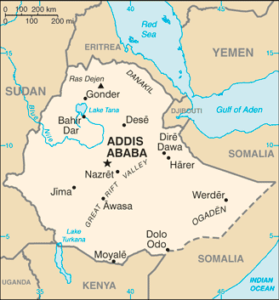In 1998, Eritrea and Ethiopia were at war. Although a ceasefire was agreed upon in the year 2000, the countries were not officially at peace. At least until now. This weekend, the leaders of Ethiopia and Eritrea met for the first time since the start of the war, and finally signed a peace agreement. This is a momentous occasion, as the war was very costly for both countries. Eritrea and Ethiopia are some of the poorest countries in the world, and the war only made things worse for people on both sides. The news was heralded throughout the continent. The BBC had reported covering the whole event. Things are getting better, it seems, as Asmara, Eritrea’s capital, will soon get a new direct flight.

Ethiopian Resumes Asmara Service
Since the start of the war, Asmara and Ethiopia were cut off from each other, with no direct flights between the countries. After the peace agreements were signed, @airlineroute reports that Ethiopian will resume service between the two capitals Addis Ababa and Asmara. The first flight will operate with Ethiopian’s flagship aircraft, the 787. Subsequent flights will be operated by a 737-800. Flights are set to start on the 18th of July, with the 737 taking over the next day.

Momentous Occasion
For me, this peace agreement symbolizes progress. After 20 years since the start of the war, both countries are resuming regular diplomatic relations, and this includes air travel between the two countries. As a world traveler, and someone who considers himself a citizen of the world, war has always had a sour taste to me. This is a positive step in the region, as it will hopefully inspire other nations that are still in a belligerent state to make peace.
Landing Thoughts:
This is a major moment for Ethiopian and Eritrean aviation. Now, the biggest airport in the region will have a direct connection to Eritrea. I have friends from both countries, and they both spoke of how unnecessary that war was, and how it took a serious toll on the people on both sides. They both agreed with me that, through dialogue and an attempt at understanding, peace could have been achieved. Thankfully, this was the end result of this war. I do not like war, and I am a firm believer that by better understanding another’s culture (through food, travel, or knowing them) war can be avoided. Let’s hope this serves as an example for the rest of the world. Let there be peace.
What do you think? Do you know anyone who lived through the war between Ethiopia and Eritrea? How do they feel about the peace agreement? Let us know!















Peace is always good news and it gives me a good reason to visit Ethiopia again so I can travel to Eritrea (and Somiliand) for the first time.